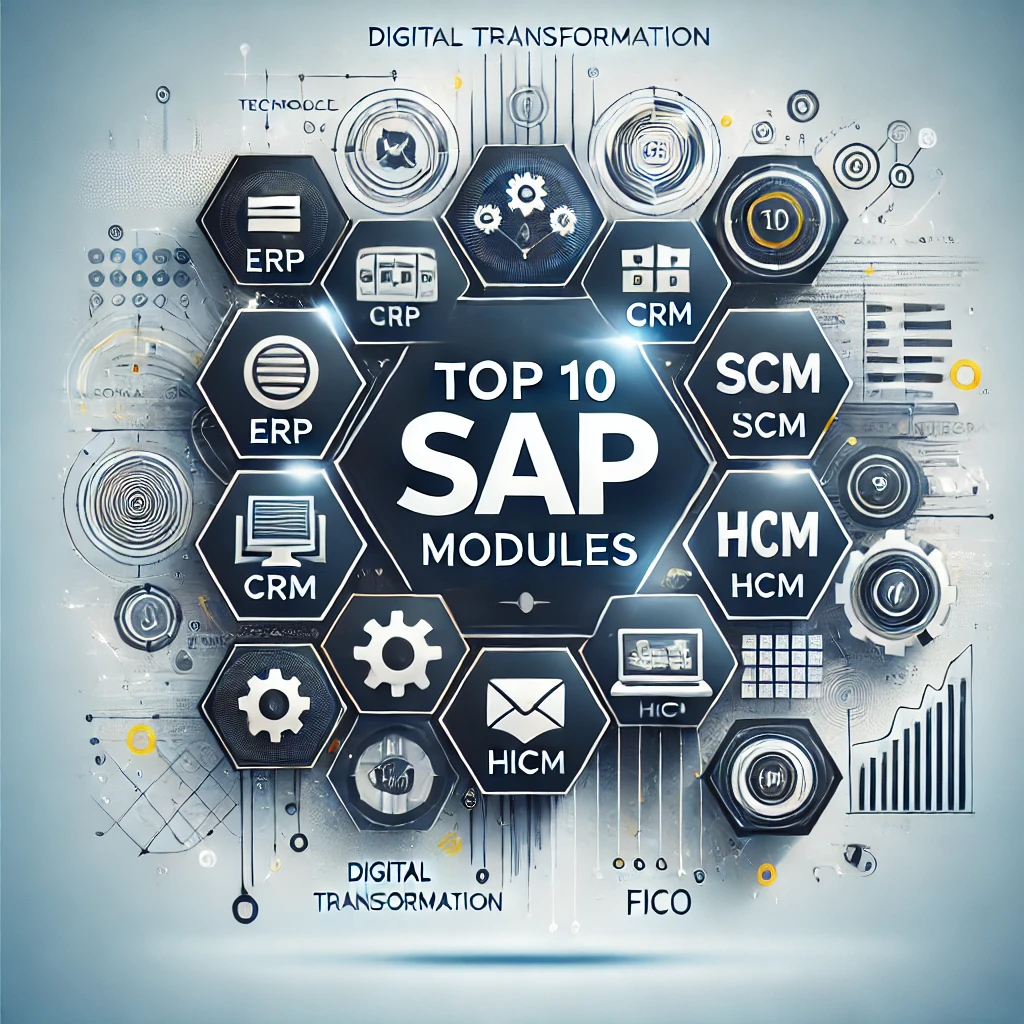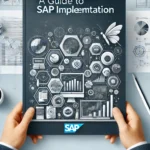Top 5 Most Popular SAP Modules for Businesses

SAP (Systems, Applications, and Products in Data Processing) is one of the leading enterprise resource planning (ERP) software systems globally. It is designed to help businesses manage their operations more efficiently. With its wide range of modules tailored to various business needs, SAP offers a robust solution for companies of all sizes. In this article, we explore the top 5 most popular SAP modules, their features, and how they can transform business operations.
Table Of Content
- What is SAP and Why is it Essential?
- Popular SAP Modules
- 1. SAP FI (Financial Accounting)
- 2. SAP MM (Materials Management)
- 3. SAP SD (Sales and Distribution)
- 4. SAP HCM (Human Capital Management)
- 5. SAP PP (Production Planning)
- Why Are These SAP Modules Important for Businesses?
- How to Choose the Right SAP Modules for Your Business?
What is SAP and Why is it Essential?
SAP is an integrated software suite that supports business management across different departments, such as finance, human resources, supply chain, and customer relationship management. Its modular structure allows organizations to implement only the parts of the system they need, making it flexible and scalable. By providing real-time data, SAP enables companies to make informed decisions and streamline their processes.
Popular SAP Modules
SAP’s popularity lies in its adaptability to various industries, offering specialized modules that address specific business functions. Here, we focus on the most popular SAP modules that are widely adopted by businesses:
1. SAP FI (Financial Accounting)
Financial management is crucial for any organization, and SAP FI (Financial Accounting) is the go-to module for handling financial transactions. It helps businesses maintain accurate financial records and comply with various legal requirements. The module integrates with other SAP modules like SAP CO (Controlling) for comprehensive financial management.
- Key Features:
- General Ledger: Manages all accounting transactions.
- Accounts Receivable and Payable: Tracks incoming and outgoing payments.
- Asset Accounting: Manages company assets and depreciation.
- Bank Accounting: Manages bank transactions and reconciliation.
- Benefits:
- Enhanced financial transparency.
- Accurate and timely financial reporting.
- Compliance with international accounting standards.
- Streamlined audits and financial closures.
2. SAP MM (Materials Management)
SAP MM (Materials Management) plays a critical role in supply chain and inventory management. It focuses on procurement and inventory functions, ensuring that materials are available for production while minimizing carrying costs.
- Key Features:
- Procurement Process: Manages purchase orders, requisitions, and supplier evaluations.
- Inventory Management: Tracks stock levels, movements, and valuation.
- Material Requirement Planning (MRP): Helps forecast material needs for production.
- Invoice Verification: Ensures that supplier invoices are accurate and match with goods received.
- Benefits:
- Streamlined procurement processes.
- Reduced inventory costs through efficient stock management.
- Improved supplier relationships and contract management.
- Enhanced accuracy in inventory tracking and reporting.
3. SAP SD (Sales and Distribution)
Sales and distribution are at the heart of revenue generation, and SAP SD (Sales and Distribution) manages the entire sales process, from order creation to product delivery. This module is integral for businesses looking to optimize their sales processes and improve customer satisfaction.
- Key Features:
- Sales Order Processing: Automates order creation and tracking.
- Pricing and Billing: Manages product pricing, discounts, and invoicing.
- Customer Master Data Management: Maintains comprehensive customer data.
- Shipping and Delivery: Manages logistics and delivery schedules.
- Benefits:
- Improved sales cycle management.
- Real-time tracking of customer orders.
- Accurate billing and pricing.
- Enhanced customer relationship management through better data integration.
4. SAP HCM (Human Capital Management)
Managing human resources effectively is essential for organizational growth. SAP HCM (Human Capital Management) helps businesses streamline HR processes, from recruitment to payroll. This module covers various HR functions, including personnel management, time management, and organizational management.
- Key Features:
- Personnel Administration: Manages employee records and information.
- Time Management: Tracks employee attendance, leave, and working hours.
- Payroll: Automates salary calculations and tax deductions.
- Recruitment and Talent Management: Supports hiring, onboarding, and performance evaluations.
- Benefits:
- Improved HR efficiency through automation.
- Enhanced compliance with labor laws and regulations.
- Accurate and timely payroll processing.
- Better employee engagement and development through talent management tools.
5. SAP PP (Production Planning)
SAP PP (Production Planning) is vital for manufacturing industries. It integrates with other modules like SAP MM and SAP SD to ensure seamless production planning and execution. The module helps businesses optimize production schedules, monitor manufacturing processes, and ensure timely delivery of products.
- Key Features:
- Master Data Management: Manages bill of materials (BOM), work centers, and routings.
- Material Requirement Planning (MRP): Plans raw material requirements for production.
- Production Orders: Manages production scheduling and order tracking.
- Capacity Planning: Ensures optimal utilization of manufacturing resources.
- Benefits:
- Enhanced production efficiency and reduced downtime.
- Real-time monitoring of production processes.
- Improved coordination between production and supply chain.
- Reduced production costs through efficient resource planning.
Why Are These SAP Modules Important for Businesses?
These popular SAP modules offer comprehensive solutions for critical business functions. By implementing the right combination of modules, companies can achieve:
- Operational Efficiency: Automation and integration streamline business processes, reducing manual efforts and errors.
- Data-Driven Decision Making: With real-time data, companies can make more informed and strategic decisions.
- Cost Optimization: Improved resource management leads to cost savings in procurement, production, and human resources.
- Scalability: SAP modules are designed to grow with the business, allowing companies to add or upgrade modules as their needs evolve.
How to Choose the Right SAP Modules for Your Business?
Selecting the right SAP modules depends on several factors, such as the industry, company size, and specific business needs. Here are a few tips to guide the decision-making process:
- Assess Business Needs: Identify areas that require improvement, such as financial management, supply chain, or production.
- Consult with SAP Experts: Engage with SAP consultants to understand the best module combinations for your organization.
- Consider Integration Needs: Ensure that the chosen modules can integrate seamlessly with existing systems.
- Budget Planning: Evaluate the cost of implementation and potential ROI for each module.


